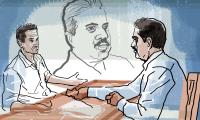Pranab Mukherjee will head for Pakistan for two-day official visit on Tuesday. The crucial visit comes at a time when Pakistan's ruling coalition is jolted by the PML (N)'s decision to pull out from the cabinet.
"Mukherjee is one of the first foreign dignitaries to visit Pakistan after the elections and that by itself is significant," said a former diplomat, a Pakistan expert.
The external affairs minister will meet his counterpart Shah Mehmood Qureshi on Wednesday. The minister will also call on President Pervez Musharraf, Prime Minister Syed Yousuf Raza Gilani, Asif Ali Zardari, Nawaz Sharif, Asfandyar Wali Khan of the Awami National Party.
The India-Pakistan peace process has been on a pause mode due to the recent turmoil in the neighbouring country.
If one reads carefully what foreign secretary Shiv Shankar Menon has been saying over the last week, it is clear that Mukherjee's visit has a narrow political agenda.
India will send across the message to Zardari and Sharif, two leaders who count the most, that "India is ready to talk. What about you?"
However, G Parthasarathy, India's former high commissioner to Pakistan asks, "When grave political uncertainty is there in Pakistan, what can they discuss?"
What is significant is that though the Jaipur blasts have taken away the visit's gloss, it is widely accepted in both countries that the peace process is steady, albeit slow.
A senior official said, "Everybody believes in the peace process within the Pakistan. It is not a political issue."
He added, "We have a Pakistan policy, not an individual policy."
What he meant was that whoever is in power in Islamabad, India will talk to them.
Besides terrorism, India has many issues like visa restrictions, transit visa to Afghanistan and Pakistan's refusal to give the Most Favoured Nation status to India.
Mukherjee's visit will reassure Pakistan's elected leaders that India wants to pick up the thread and discuss all bilateral issues.
"This is the first-ever high-level meeting between the two countries since the formation of a democratic government in Pakistan. Its significance lies in the fact that Mukherjee will meet the "old and new" leaders of Pakistan. So far, Zardari and Sharif have been sending positive signals to India and that is very important," said a high-level official, who deals with Pakistan.
Sources in New Delhi claim that the parameters set between Prime Minister Atal Behari Vajpayee and President Musharraf in January 2004 can still work even after four years.
An external affairs ministry official says that the commitment given by Musharraf not to allow any territory in Pakistan to be used for terrorism against India should be matched by action.
India thinks that even Pakistan is a victim of terrorism as seen in case of the Benazir Bhutto's assassination, said a senior official.
A Pakistan expert within the government brushed off Pakistan's Prime Minister Gilani's views on the Kashmir issue.
Gilani said the proposals discussed with India in the recent years to resolve the Kashmir issue were "half-baked" and it didn't have the mandate of Parliament.
Contrary to President Pervez Musharraf's diplomatic line, Gilani argued that Pakistan wants the Kashmir issue settled according to the UN resolution.
India is keen to know what the new government in Pakistan wants to say during the official meetings on these issues, said the official.
But too many discouraging developments have surfaced before the high-level visit like the Jaipur blasts and Monday's incident where an Indian soldier was killed by Pakistan's soldiers at the LoC.
The blasts have forced India to put terrorism top on agenda. Though Menon has already told the media, "In talks with Pakistan, the Composite Dialogue, what I will go for first is for the review of the fourth round. The foreign secretaries have been assigned to discuss peace and security in Jammu and Kashmir, apart from the overall composite dialogue, all the other six subjects. So, under Peace and Security certainly terrorism is very high on our agenda. As you know, we have always said that an absence of violence, that stopping cross-border terrorism is a very high priority. It is necessary condition in many ways for what we are trying to achieve here in the relationship with Pakistan. So, certainly we will raise it and we look forward to discussing and then to dealing with it."
When asked in the press briefing on May 14, "Why are there all these terrorist attacks? Is it building up to something,?" Menon said, "I do not want to get into a hypothetical mind-reading exercise, quite frankly. I would rather deal with the facts as they are and then tell you after that where we are."
Menon is consistently giving signals of moderation and is talking about keeping the diplomatic channel open with Pakistan on terrorism. He told the media before leaving for Islamabad that "terrorism will be the major issue" when both sides meet".
On the Jaipur blasts, he has put it on record India's viewpoint that, "We are still in the process of investigating. I do not want jump into conclusions, saying everything that at this stage. Let us look through it. When we reach some conclusions, we will see where the sources are, where the roots are, where it has come from, how it has happened. Then we will decide what we do."
Parthasarathy says, "It will be very disappointing if they underplay the issue of cross-border terrorism."
However, the biggest message emanating from Mukherjee's visit is that terrorism within India will not put on hold the bilateral relations nor will it close the doors on its western neighbour. The UPA government's Pakistan policy is that the talk must go on.







